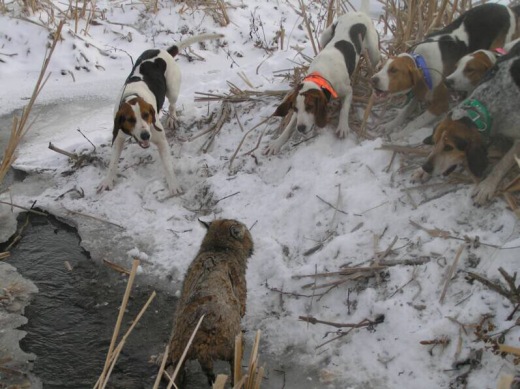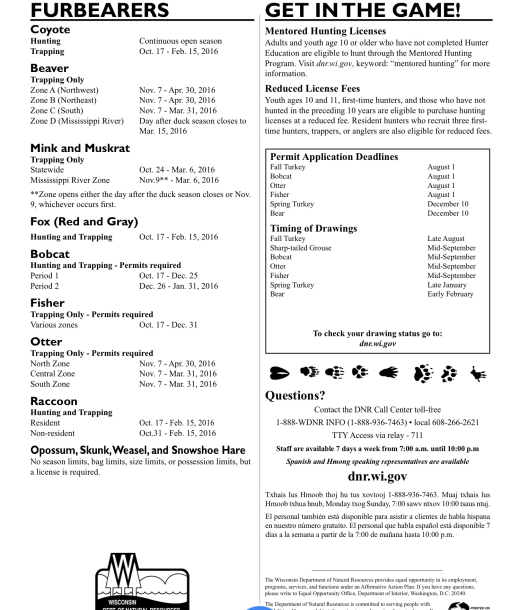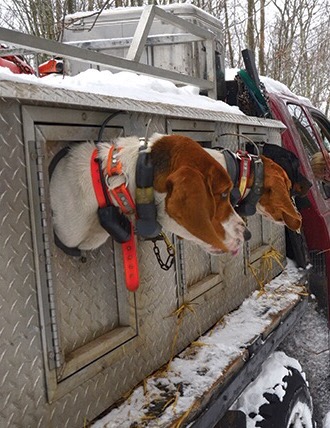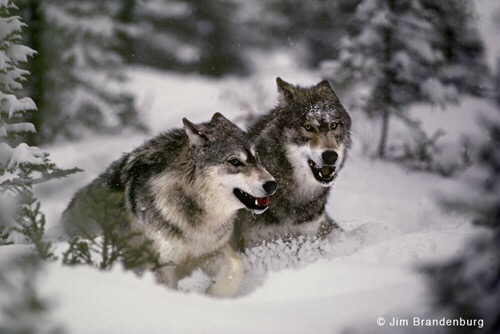
At this time of year Wisconsin’s north woods is over run with hunting activity. Wisconsin Department of Natural resources (WDNR) news release has it that wolf on dog attacks has increased, the following news article:
Wisconsin wolf on dog attacks increase, wildlife experts say…
“Wildlife experts say wolves have killed or seriously injured six dogs in Wisconsin this month.
That’s double the highest number for January in recent years. Two dogs have been killed in Oconto County.
Department of Natural Resources wildlife supervisor Jeff Pritzl says the spike in incidents doesn’t necessarily reflect any changes wolf population or behavior. Pritzl tells WLUK-TV (http://bit.ly/1Cuws11) that more people are out hunting coyotes, bobcats, and rabbits with their dogs because of the milder winter.
Pritzl says the peak time for wolf-related incidents is late summer and early fall. He says most of the activity is usually in the northwest part of the state.
There’s been a wolf hunt in the past three years, however the wolf has now been relisted as an endangered species.” From http://www.twincities.com/localnews/ci_27403173/wisconsin-wolf-dog-attacks-increase-wildlife-experts-say
WDNR does admit that due to the milder winter more people are out hunting coyotes, Bobcats, and rabbits with their dogs. Could this be why there is a surge of conflicts between wolves and hunting dogs?

Poster from WDNR website
Conflicts between dogs and wolves.
Hunting bobcat just ended January 31, 2015 (trapping and use of dogs) but coyotes are open season all year. WDNR educates on how to avoid conflicts with wolves and hunting dogs on its website. Link is here: http://dnr.wi.gov/topic/wildlifehabitat/wolf/guidance.html
Hounding hunting dogs used to track and trail bear, coyote, and Bobcats are at greater risks because they run far ahead of their handlers. Whereas, if you are hunting birds with dogs they stay close to the handler/hunters and the conflict between bird dogs and wolves is reduced.
The days of following closely behind hounds on leases has been replaced with modern technology. Hound hunters use long range monitoring devices such as dog collars are now equipped with radio telemetry antennas.
Conflicts are possible if hound hunters are running dogs to track and trail coyotes year round 24 hours a day. Especially when coyote hound handles use radio telemetry as a method of monitoring their dogs. While hound hunters sit in trucks equipped with radio telemetry antennas their dogs are often miles ahead of them.

Photograph from http://www.wvliving.com/Winter-2013/The-Great-Bear-Hunt/
Hunting with hounds, quote from the WDNR website:
“Hounds often hunt some distance from hunters, and their baying sound may present a challenge to the territorial wolves. The highest risk of wolf depredation to dogs seems to occur in July through September, and a moderately high risk occurs in December. These periods signal the summer rendezvous period, and the approach of the winter breeding season.” Link here: http://dnr.wi.gov/topic/wildlifehabitat/wolf/guidance.html
Hound hunters are reimbursed for their dogs.
Conflicts can arise when hound handlers send their hounds into wolf territory, especially at certain times of the year. During summer months wolves are protective of their vulnerable pups and will defend them against a pack of bear hound hunting dogs. When wolves kill bear hounds defending their pups reimbursement is paid up to $2,500.00 per dog.
Wolves are territorial during winter months during prime breeding season. Wolves guard and protect their alpha females that are in estrus (mating) at these times.

Reducing conflicts between wolves and dogs.
From WDNR website: http://dnr.wi.gov/topic/wildlifehabitat/wolf/guidance.html
*find information on the dog depredation page or from your local wildlife biologist about possible wolf attacks on dogs in your hunting area;
*attempt to stay as close to dogs as possible;
*move two or three miles from any rendezvous site, if possible, before releasing dogs;
*avoid releasing dogs at bear baits recently visited by wolves;
*avoid areas with high concentrations of wolf tracks, scats and remains of wolf kills;
*learn to recognize your own dog tracks so that you can distinguish them from wolf tracks; and
*use bells or beepers on dogs.
Hound hunting presents numerous challenges to wildlife. Hound hunters run their dogs through the north woods of WI twenty four-seven year round and especially in winter months.
Wolves defending their pups and mates from packs of unleashed dogs become scapegoated. Because these handlers want their right to run dogs to hunt furbearing animals. Deer, wolves, rare birds, fox, and other wildlife are disturbed by hound hunting dogs running unleashed through WI’s north woods.
WDNR must enforce rules, but how is that possible when one animals is sacrificed to appease recreational hound hunting?
Read more on hound hunting use of dogs to hunt wolves (use of dogs illegal to hunt wolves as of December 19, 2014) in a previous blog here: http://wolvesofdouglascountywisconsin.com/2014/08/13/wodcw-faq-sheet-on-wolf-hound-hunting/



No comments:
Post a Comment